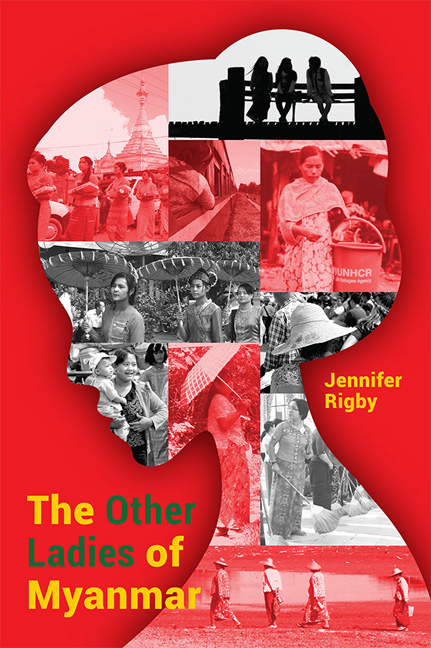Book contents
- Frontmatter
- Dedication
- Contents
- Preface
- Acknowledgements
- Introduction
- Timeline
- 1 The Activist: Cheery Zahau
- 2 The Feminist Buddhist Nun: Ketu Mala
- 3 The Survivor: Mi Mi
- 4 The Businesswoman: Yin Myo Su
- 5 The Environmental Campaigner and Princess: Devi Thant Cin
- 6 The Artist: Ma Ei
- 7 The Refugee Sexual Health Nurse: Mu Tha Paw
- 8 The Rohingya and Human Rights Champion: Wai Wai Nu
- 9 The Farmer: Mar Mar Swe
- 10 The Pop Star: Ah Moon
- 11 The Politician: Htin Htin Htay
- 12 The Archer: Aung Ngeain
- Conclusion
- About the Author
9 - The Farmer: Mar Mar Swe
Published online by Cambridge University Press: 08 June 2019
- Frontmatter
- Dedication
- Contents
- Preface
- Acknowledgements
- Introduction
- Timeline
- 1 The Activist: Cheery Zahau
- 2 The Feminist Buddhist Nun: Ketu Mala
- 3 The Survivor: Mi Mi
- 4 The Businesswoman: Yin Myo Su
- 5 The Environmental Campaigner and Princess: Devi Thant Cin
- 6 The Artist: Ma Ei
- 7 The Refugee Sexual Health Nurse: Mu Tha Paw
- 8 The Rohingya and Human Rights Champion: Wai Wai Nu
- 9 The Farmer: Mar Mar Swe
- 10 The Pop Star: Ah Moon
- 11 The Politician: Htin Htin Htay
- 12 The Archer: Aung Ngeain
- Conclusion
- About the Author
Summary
CYCLONE NARGIS — a deadly storm whose clouds have gathered ominously at various points in this book — was a tragic episode in Myanmar's recent history.
After years of man-made misery and destruction at the hands of the generals, the natural world took its turn in the early hours of 2 May 2008. A huge tropical storm tore into the south of the country, leaving devastation in its wake.
According to official figures, 84,500 people were killed in the high winds, rains and floods, the three-metre-high storm surge, and the resulting destruction of villages, bridges and roads, mainly in the coastal Ayeyarwady Delta region.
A further 53,800 were reported missing, later presumed dead, possibly swept out to sea in the storm.
In reality, probably many more were hit. The UN has estimated that up to 2.4 million people were affected by Nargis, Myanmar's worst ever natural disaster. Millions were left homeless.
While Yangon also suffered, it was in the Ayeyarwady region that the storm really wreaked havoc. Many people there live simple lives as subsistence farmers or fishermen, and Nargis destroyed up to 95 per cent of buildings in some areas, as well as decimating crops and livelihoods.
The tragedy was exacerbated when the ruling military junta initially forbade international aid from coming into the country, a ban that was overturned after global outcry.
But figures like this can be hard to quantify. For Mar Mar Swe, a female farmer living close to Bogale in the delta region, the horror was much closer to home.
She had already had a rough few years. Her husband had died after many years of illness, leaving her alone with their baby son and other children, and badly in debt. Then came Nargis.
“I had been struggling, but then Nargis hit, and it destroyed my properties and my houses,” she says. “It was a nightmare time for me. I suffered so much.”
Things hadn't always been so bad for Mar Mar Swe. When she and her husband married, they received around eight acres of land from their families in their home village of Kyee Chaung. Like around 70 per cent of Myanmar's population, they lived rurally, supporting themselves. For a while, they were happy, working their land and looking after their kids.
- Type
- Chapter
- Information
- The Other Ladies of Myanmar , pp. 92 - 97Publisher: ISEAS–Yusof Ishak InstitutePrint publication year: 2018



